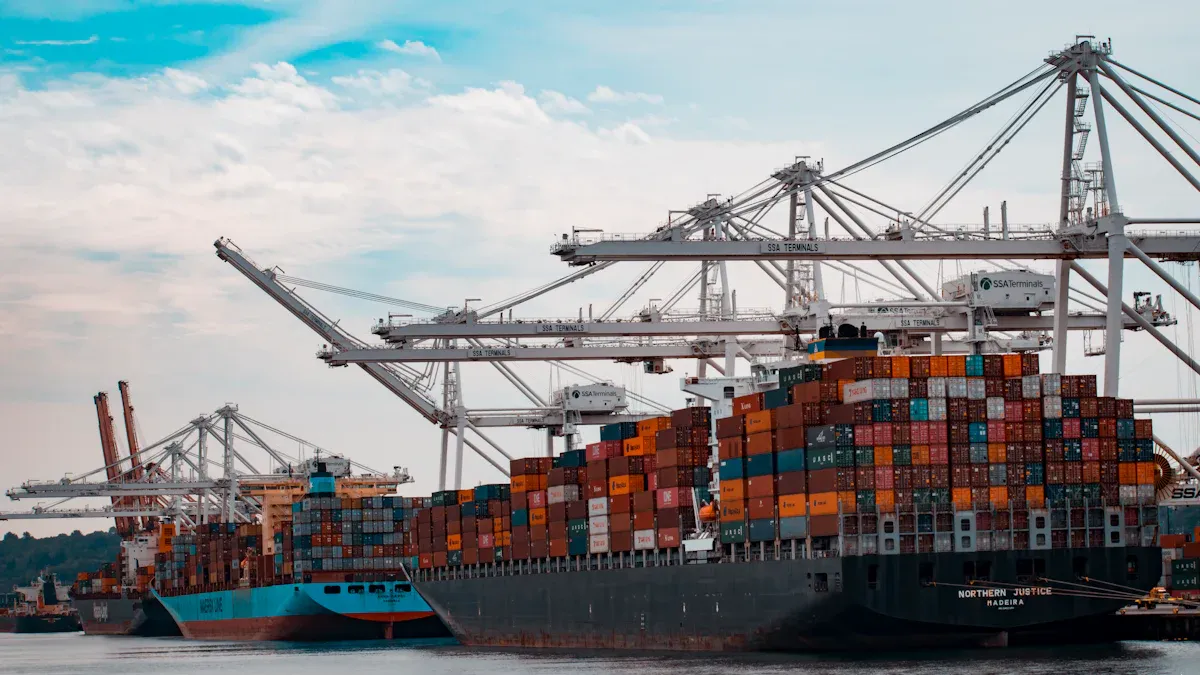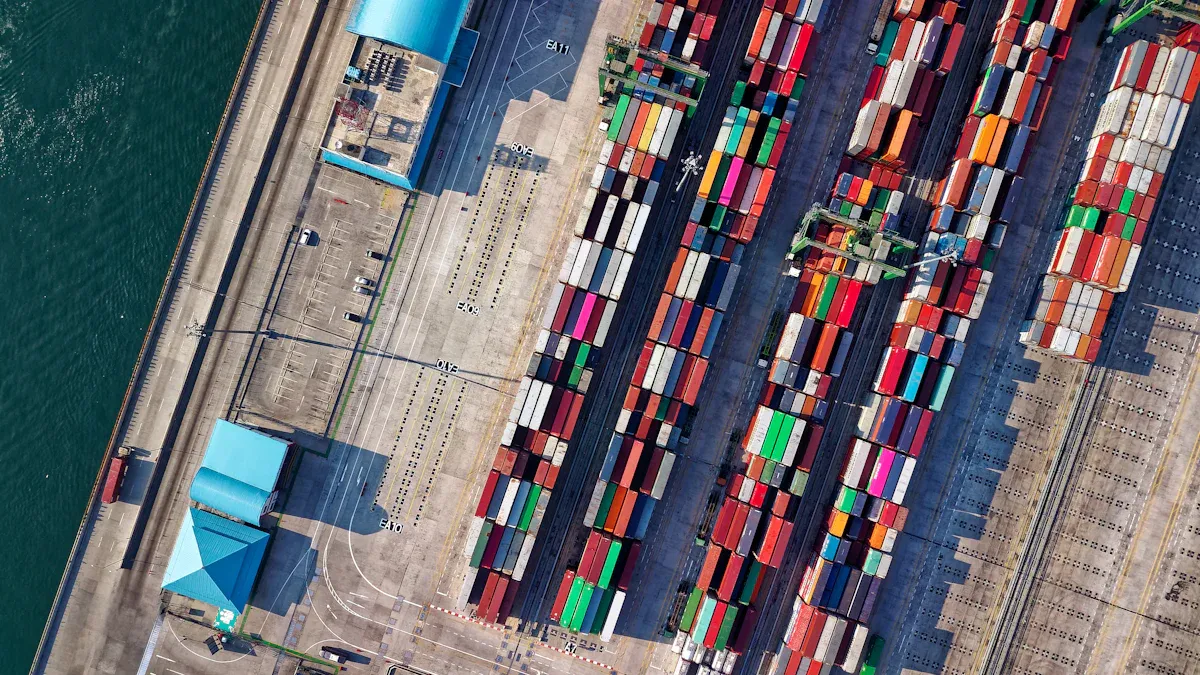What Logistics Brokers Do for Shipping Solutions

You rely on logistics brokers shipping solutions when you want your goods to move smoothly from point A to point B. These experts act as the bridge between shippers and carriers. They help you find the right transportation for your cargo and negotiate the best rates.
Brokers connect shippers with carriers, offering access to a wide network and handling negotiations so you do not have to. They make it easier for carriers to fill their trucks and for you to find reliable partners.
Many businesses now trust brokers for their shipping needs.
The share of truck freight managed by brokers has grown from 6% in 2000 to over 20% today.
Brokers optimize supply chains, reduce costs, and improve efficiency.
Understanding how brokers work gives you an edge in making your shipping process faster and more reliable.
Key Takeaways
Logistics brokers connect shippers with carriers, saving you time and effort in finding transportation for your goods.
Using brokers can lead to cost savings as they negotiate better rates and handle paperwork, allowing you to focus on your business.
Brokers provide real-time tracking and updates, improving customer satisfaction and helping you manage your shipments effectively.
Choosing a reliable broker involves asking the right questions about their experience, technology, and communication practices.
Brokers help you navigate shipping challenges, offering flexibility and support during busy seasons or unexpected issues.
Logistics Brokers Shipping Solutions Explained

Connecting Shippers and Carriers
You need a reliable way to move your goods. Logistics brokers shipping solutions help you connect with the right carriers for every shipment. Brokers maintain strong relationships with many carriers. This network gives you access to a wide range of freight options. You do not have to spend time searching for trucks or negotiating rates. Brokers handle these tasks for you.
Brokers build trust by paying carriers on time and following ethical business practices.
They offer carriers a variety of freight types, which helps carriers keep their trucks full.
Brokers use internal load boards. Carriers can pick loads that match their routes and equipment.
You benefit from transparent payment processes and quick pay options.
Tip: Using logistics brokers shipping solutions means you can focus on your business while experts manage your shipping needs.
Managing the Shipping Process
You want your shipments to arrive safely and on time. Logistics brokers shipping solutions manage the entire process from start to finish. Here is how the end-to-end process usually works:
You request quotes and place your order.
The broker organizes the shipment and books space with a carrier.
The broker arranges export and import clearance if needed.
Your goods move in transit.
The broker ensures your shipment clears customs at the destination.
The broker arranges final delivery to your chosen location.
Brokers act as your single point of contact. You do not have to coordinate with multiple parties. They solve common challenges such as tracking shipments, handling claims, and auditing invoices. Brokers also negotiate contracts and measure carrier performance to keep your costs low and your shipments on track.
Technology and Real-Time Tracking
You want to know where your shipment is at all times. Logistics brokers shipping solutions use advanced technology to give you real-time updates. Common tools include:
GPS tracking
RFID tagging
IoT devices
APIs and cloud computing
These tools let you see your shipment’s location and status. Many brokers offer user-friendly apps or online dashboards. You can check your order anytime. Real-time tracking improves customer satisfaction. For example, companies that use these tools see more repeat business and happier customers. A recent survey found that 70% of people prefer brands that give proactive delivery updates.
Note: Real-time data helps brokers optimize routes and avoid delays, so your goods arrive on time.
Digital platforms are changing the industry. About 15% of shippers now use digital freight platforms for booking and tracking. This trend will grow as more companies want transparency and fast communication.
Handling Paperwork and Compliance
Shipping involves a lot of paperwork. Logistics brokers shipping solutions help you stay compliant with all rules and regulations. Brokers keep detailed records for every shipment. They double-check documents for accuracy and use software to manage files. This reduces mistakes and saves you time.
Description | |
|---|---|
Keeping Records | Brokers keep transaction records for three years. |
Avoiding Misrepresentation | Brokers clearly state their role in all ads and documents. |
Not Charging Carriers | Brokers do not charge carriers for services where they have a shipment interest. |
Correct Accounting | Brokers track all revenues and expenses accurately. |
Food Safety Rules | Brokers follow food safety rules and keep proper training records. |
Brokers prepare for audits and inspections. They use high security standards in loading and storage areas. By investing in document management software, brokers make sure your shipments meet all legal requirements.
Key Benefits of Using Logistics Brokers

Cost and Time Savings
You want to save money and time when shipping your goods. Logistics brokers shipping solutions help you do both. Brokers use their strong relationships with many carriers to get better rates than most businesses can find on their own. They also handle paperwork and manage the shipping process, so you spend less time on logistics and more time on your business.
Cost Saving Aspect | Description |
|---|---|
Brokers negotiate discounted rates with carriers, which individual businesses may not access. | |
Reduced Administrative Burden | Using brokers minimizes the paperwork and management tasks for businesses. |
Access to Larger Network of Carriers | Brokers provide access to a wider range of transportation options, leading to competitive pricing. |
You also save time because brokers coordinate pickups, track deliveries, and solve problems during transit. Many use advanced systems that give you real-time updates, so you always know where your shipment is.
Tip: By letting brokers handle logistics, you can focus on growing your business.
Flexibility and Capacity Management
Shipping needs can change quickly. You might need more trucks during busy seasons or special equipment for certain loads. Brokers give you flexibility by connecting you with a large network of carriers. They use digital tools to monitor shipments in real time and help you manage your logistics more effectively.
Real-time tracking lets you see where your freight is at any moment.
Brokers use transportation management software to give you proof of delivery and compliance.
Automation reduces manual work, making shipping faster and more efficient.
Brokers help you find extra capacity when you need it, so you never miss a delivery.
Access to Reliable Carriers
You want your goods in safe hands. Brokers check each carrier’s safety record, insurance, and authority before booking your shipment. They use strict criteria to choose the best partners.
Criteria | Description |
|---|---|
CSA Ratings | Ratings based on safety audits by the FMCSA. |
Level of Active Authority | Carriers must have the right federal authority to haul freight. |
Internal Rating System | Brokers use a 5-star system based on carrier history, size, and quality of service. |
This careful selection means you get reliable service and fewer shipping problems.
Risk Reduction and Support
Shipping can bring risks, like delays or lost cargo. Brokers lower these risks by using real-time tracking, clear communication, and strong planning. They check that carriers have proper insurance and safety ratings. If something goes wrong, brokers act fast. They find emergency freight, give you critical updates, and help you plan for urgent needs.
Real-time tracking helps spot problems early.
Brokers use data to predict trends and manage costs.
They keep your information safe with cybersecurity measures.
You get support during emergencies, with quick responses and expert project management.
Note: With logistics brokers shipping solutions, you gain peace of mind knowing experts are ready to help at every step.
When to Use a Logistics Broker
Handling Fluctuations and Surges
You often face busy seasons when shipping needs spike. Logistics brokers help you manage these surges with smart strategies. They use accurate forecasting to predict demand patterns. You get flexible capacity management, which means you can scale your shipping up or down as needed. Brokers work closely with logistics partners to share resources and boost efficiency during peak times.
Strategy | Description |
|---|---|
Accurate Forecasting | Helps you predict demand patterns using past data and market trends. |
Flexible Capacity Management | Lets you adjust shipping capacity based on current needs. |
Collaboration with Logistics Partners | Improves resource sharing and efficiency during busy periods. |
Optimized Inventory Management | Keeps your stock levels balanced to match demand. |
Embracing Technology | Uses advanced tools for tracking and managing shipments. |
You do not need to invest in extra trucks or staff. Brokers offer rapid scalability, so you meet increased shipping demands without extra costs. They help you manage inventory and avoid shortages or excess stock. By planning ahead, you keep your operations smooth even when business picks up.
Tip: Brokers use technology to track shipments and update you in real time, making it easier to handle busy periods.
Solving Shipping Challenges
You may run into problems with your current shipping providers. Logistics brokers step in when you need reliable solutions. Here are common situations when businesses turn to brokers:
You want to lower transportation costs and avoid delays.
You face reliability issues with your current shipping partners.
You need extra capacity or resources to meet growing demand.
Brokers help you solve these challenges by offering access to a wide network of carriers. They negotiate better rates and ensure your shipments arrive on time. You get support for urgent deliveries and help with paperwork. Brokers also use data to spot trends and prevent problems before they happen.
You gain rapid scalability for shipping needs.
You avoid investing in extra resources.
You manage peak demand efficiently.
Note: When you face shipping challenges, a logistics broker gives you expert support and peace of mind.
Choosing a Logistics Broker
Qualities to Look For
You want a logistics broker who can handle your shipping needs with skill and honesty. The right broker uses technology, knows your industry, and follows safety rules. Good brokers keep you informed and offer clear prices. Here is a table that shows the most important qualities:
Quality | Description |
|---|---|
Technology Capabilities | Easy onboarding and custom solutions for trucking companies. |
Industry Experience | Knows your sector and can solve unique problems. |
Compliance and Safety | Follows strict rules to keep shipments safe and legal. |
Communication and Support | Strong network and quick updates for shippers and carriers. |
Pricing Transparency | Clear prices and fair deals for drivers. |
Tip: Choose a broker who uses real-time tracking and gives you updates at every step.
Questions to Ask
You need to ask smart questions before you pick a broker. These questions help you learn about their network, experience, and how they solve problems.
Do you own trucks or only act as a broker?
How do you check and monitor your carrier partners?
What steps do you take when problems happen during transit?
How do you share shipping updates and handle issues?
What is your pricing method? Is it clear and fair?
How do you make sure there is enough capacity during busy times?
What is your claims process and success rate?
What technology do you use? Can it adapt to my needs?
Note: A good broker answers your questions quickly and clearly.
Signs of Trustworthiness
You want a broker you can trust with your shipments. Look for these signs:
Strong carrier relationships—check their network size.
Ability to handle different freight types.
Proper licenses and accreditations.
Clear and open communication style.
Watch out for poor communication, hidden fees, or a small carrier network. Honest brokers give you detailed cost breakdowns, real-time tracking, and fast responses. They keep you informed and set realistic expectations, building trust that lasts.
Logistics brokers give you many advantages when shipping goods. You gain flexibility, expertise, better rates, and time savings. Brokers use advanced technology and offer a variety of shipping options.
Benefit | Description |
|---|---|
Brokers secure competitive rates for your needs. | |
Industry Expertise | You get guidance from logistics professionals. |
Technology Tools | Real-time tracking keeps you informed. |
Before choosing a broker, review your products, shipping concerns, and past experiences. Next, learn about logistics, keep records, and connect with trusted shippers and carriers. These steps help you build efficient shipping solutions for your business.
FAQ
What is the difference between a logistics broker and a freight forwarder?
You work with a logistics broker to connect with carriers and arrange transportation. A freight forwarder manages the entire shipping process, including customs and storage. Brokers focus on finding trucks and negotiating rates. Freight forwarders handle more complex logistics.
How do logistics brokers choose carriers?
You benefit from brokers who check carrier safety records, insurance, and authority. Brokers use rating systems and review past performance. They select carriers who meet strict standards for reliability and compliance.
Can logistics brokers help with international shipping?
You get support for international shipments from many brokers. They help you find carriers, manage customs paperwork, and track shipments across borders. Some brokers specialize in global logistics and offer extra services for overseas shipping.
What technology do logistics brokers use?
You see brokers using GPS tracking, cloud-based dashboards, and automated alerts. These tools give you real-time updates and help you manage shipments easily. Technology improves visibility and reduces delays.
How do I know if a logistics broker is trustworthy?
You look for brokers with strong reputations, clear communication, and proper licenses. Ask for references and check reviews. Trustworthy brokers give you transparent pricing and regular updates.
See Also
Enhancing Global Operations Through Innovative Logistics Strategies
PGL's Miami Warehouse Solutions Ensure Quick East Coast Shipping
Streamlining Supply Chains Across America With Global Logistics
PGL Specializes in LTL and FTL Freight Shipping Services
Strategic Warehousing Solutions in Miami and LA for Supply Chain Efficiency
